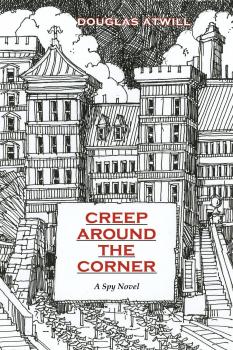Douglas Atwill
Список книг автора Douglas AtwillCreep Around the Corner
Europe in the Cold War years was a dangerous place for Harold Bronson and his buddies, draftees commandeered into espionage and counterintelligence. Their low echelon escapades take them to Berlin, Ulm, the South of France, and Zurich. Bronson chooses this time of his life to explore a personal coming out, creating secrets within secrets in a disapproving military. In his off-time, Bronson paints portraits of the other denizens of Schloss Issel, earning money for trips and adventures to Paris and Nice. Always on the edge of life, he taunts the higher-ups with a light-hearted acceptance of life in the spy world of 1957. Real danger is further off from his circle at the Schloss, but it is an insistent melody they can always hear. Other books by DOUGLAS ATWILL, all from Sunstone Press, are “Imperial Yellow,” “The Galisteo Escarpment” and “Why I Won’t Be Going To Lunch Anymore.” Atwill lives in Santa Fe, painting New Mexico landscapes and gardens from his studio on the city’s Eastside.
The Galisteo Escarpment
Neil Bronson, new from the Royal Academy, summers in Provence, teaching himself to paint outside. Before returning home, he and his friends, Sam and Carrie, rent a cottage on the coast, playing a langorous triangle of seaside sexual attraction. Neil’s uncle interrupts the idyll, urgently seeking their help teaching at his art school in Santa Fe. A month later, Bronson and Sam move into Casa Marriner and meet the faculty members, several jealous and difficult. Bronson teaches plein air classes, often at the Galisteo escarpment. At first, the students are confrontational and awkward, but they soon grasp his enthusiasm with the New Mexico landscape. While they learn new skills, he refines his, taking the escarpment as a major motif. Crisis at the school involves Bronson in a curious project and a trip abroad to Greece. Besides discovering himself in Santa Fe, he explores the world of sex and love with one of his students, Salazar. New York must wait. DOUGLAS ATWILL’s early days were in Pasadena, California and Midland, Texas. He served in the US Army Counterintelligence Corps and earned a BA from University of Texas at Austin. After some years in Virginia and Europe, he settled in Santa Fe to pursue painting full-time. From a studio on Canyon Road, he paints landscapes and paintings of his own garden. His work is shown in galleries throughout the nation. Atwill’s avocation of house design, small vernacular residences in classic Santa Fe style, many of which have been featured in books and magazines, has brought him a reputation for excellence. His collection of short stories, “Why I Won’t Be Going to Lunch Anymore,” was published in 2004 by Sunstone Press. This is his first novel.
Why I Won't Be Going To Lunch Anymore
Outsiders seldom understand the curious amalgam of artists, galleries, misfits and hangers-on known as the Santa Fe Art Scene. In this collection of stories, we witness a group of Santa Fe painters confronting their art and life in creative ways, solving the ages-old problems of painting the perfect canvas, making that obstinate muse smile. Julia Brownell is a patrician beauty whose exhibition of gold-leafed paintings sells out on its opening night and creates an envious discord among her peers. As Parsley Tiddle approaches the end of his creative life, he will not give up his randy ways, to the delight of his younger friends and the wrath of his socialite sister. The narrator of the title story jeopardizes his friendship with Donald Strether, a painter of small abstractions and a devoted rascal, by his disclosures to the guests at a summer luncheon party in the foothills. Robert Fenwick, a New Mexico plein air painter of note, discovers that a commission for landscapes of the Barbados cane fields is a more upside-down proposition than he bargained for. There is a keen sense of irony and suitable punishment for the crime in Atwill’s stories, light-hearted views of the obstacles and the ever-present challenges to making a living from art. Several of the stories are concerned with goings-on in the studio of Alabaster Prynne, a wellborn, Philadelphia spinster, now in spattered coveralls, who befriends artists fresh from school and offers them her encouragement and cautions. The sprawling compound of adobe studios called Casa Marchment is the setting for a tale of earnest, untried artists as they find out that all is not what it appears in the estate of Victor Marchment, a brilliant landscape painter from the early years. Each story contains the secret to a Santa Fe painter, facing craft and life, and how he or she confounds the conventional view of what it is to be an artist. DOUGLAS ATWILL was born in Pasadena, California, earned a BA from the University of Texas at Austin and he served in the Army Counterintelligence Corps. After a long sojourn on a Piedmont cattle farm in Virginia and on the move throughout Europe, he settled in Santa Fe to pursue painting full-time. From a studio on Canyon Road, he paints landscapes and paintings of his own gardens. His work is shown in galleries throughout the West. Atwill’s avocation of restoring adobe houses and building them anew has earned him a reputation for excellence in taste and design, and his houses have been featured in many magazines and books. This is his first collection of short stories.


